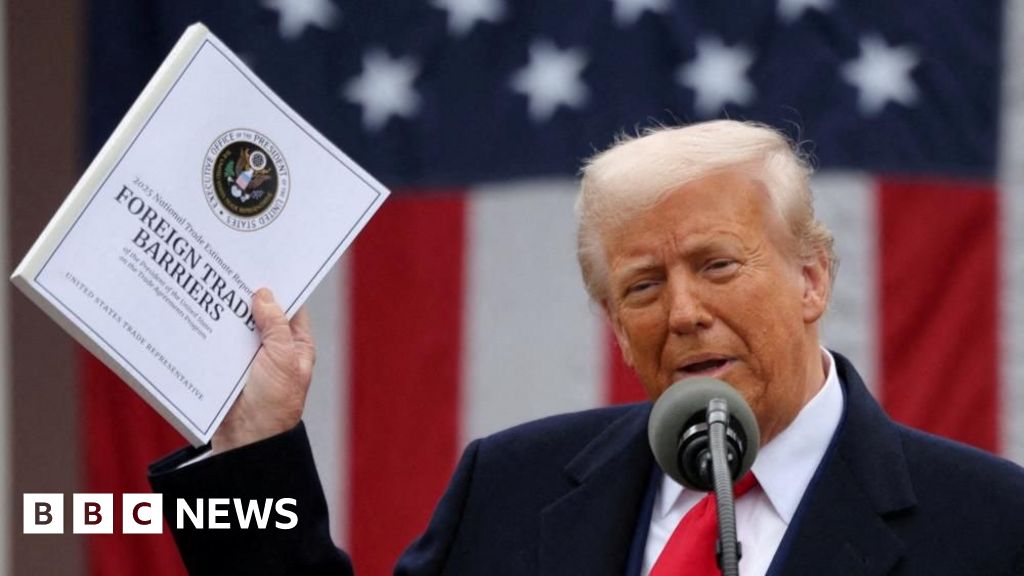Trump's Tariffs: A New Chapter in Global Trade

In a controversial announcement that has sent shockwaves through international markets, US President Donald Trump declared sweeping tariffs on imports from various nations, dubbing the day "Liberation Day." With this move, Trump asserts that he aims to restore American wealth and bolster the domestic economy. However, this ambitious strategy has drawn warnings from economists who caution that it may lead to increased prices for American consumers and potentially ignite a global trade war.
So, what exactly are tariffs? In essence, tariffs are taxes imposed on goods imported from foreign countries. When companies bring these goods into the United States, they are required to pay a tariff based on a percentage of the goods' value. In his announcement, Trump revealed a foundational tariff of 10% on imports. This baseline rate will apply to countries like the UK. However, a total of 60 nations will face much steeper tariffs, with rates soaring up to 50% for countries including Cambodia, Vietnam, Malaysia, and Bangladesh. Member states of the European Union are looking at a hefty 20% tariff. These tariffs are set to be implemented within days, and alongside them, previously announced tariffs on select goods—25% on steel, aluminum, and foreign-manufactured cars—will also take effect.
The rationale behind Trump’s aggressive tariff strategy stems from his long-held belief that such taxes can significantly enhance the US economy. He argues that they will incentivize American consumers to choose domestically produced goods over foreign imports, thereby increasing tax revenue and narrowing the trade deficit. The White House asserts that other countries have been benefiting at the expense of the United States, imposing their own high tariffs and trade barriers. “For decades, our country has been looted, pillaged, raped, and plundered by nations near and far, both friend and foe alike,” Trump stated emphatically.
However, this bold approach is not without considerable risks. As noted by the BBC's North America correspondent Anthony Zurcher, Trump’s gamble on tariffs could fundamentally alter the global economic landscape. If successful, it may revitalize American manufacturing and lead to greater economic self-sufficiency. Yet, the implications of this strategy could alienate traditional allies and exacerbate tensions with major trading partners. Economists fear that these tariffs could elevate consumer prices and even trigger a recession, with the specter of a global trade war hanging ominously in the air. BBC Economics Editor Faisal Islam highlights that the magnitude of Trump’s tariff revenues could surpass those seen during the turbulent 1930s, prompting significant shifts in international trade dynamics.
As for American consumers, many economists anticipate that the increased costs associated with imported goods will inevitably be passed down to them. Companies may respond to these tariffs by either hiking prices or scaling back imports, resulting in limited product availability and further inflationary pressure. To meet the revenue targets envisioned by Trump, American households will likely need to absorb these price increases while continuing to purchase imported goods at current levels. The consequences could be far-reaching, affecting everything from automobiles and lumber for housing to consumer staples like beer, whiskey, tequila, and avocados.
The international response has been swift and critical. Markets around the world saw declines in reaction to Trump’s announcement, with numerous world leaders voicing their disapproval. European Commission President Ursula von der Leyen warned that "the consequences will be dire for millions of people around the globe." In response to the 25% tariffs on steel and aluminum, EU nations are coordinating their countermeasures, which may include protective measures for key industries such as Germany's automotive sector, Italy's luxury goods, and France's wine production. Meanwhile, China has vowed to enact "resolute countermeasures," which could adversely affect US businesses that rely on access to the vast Chinese marketplace. Interestingly, some analysts suggest that Trump’s tariffs might inadvertently benefit China, allowing President Xi Jinping to position his nation as a defender of free trade.
In the UK, Prime Minister Sir Keir Starmer acknowledged the adverse effects of these tariffs on the British economy but urged for a composed response. Business Secretary Jonathan Reynolds assured Parliament that the government would carefully consider the implications of retaliatory tariffs on British firms. Canada’s Prime Minister Mark Carney declared that the nation would respond aggressively to US tariffs, introducing a 25% levy on all vehicles imported from the US that do not comply with the current North American free trade agreement.
As the global landscape shifts, the uncertainty surrounding the impact of these tariffs looms large. In the UK, which faces a 10% tariff on goods destined for the US, the outlook remains murky. While the dollar's potential strengthening could increase import costs for British businesses, some economists speculate that initial drops in prices may occur as firms redirect their product flows to countries like the UK instead. The potential fallout could extend to job markets, as rising prices may lead to greater demands for wage increases, and squeezed profits could result in job cuts. Furthermore, with interest rates currently at 4.5%—previously anticipated to fall—higher inflation stemming from increased tariffs might force rates to remain elevated for a longer period.
As the world watches closely, the implications of Trump’s tariff strategy on the US economy and global trade remain a topic of heated debate. The unfolding events will undoubtedly shape international relations and economic policies for years to come.




























